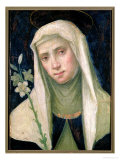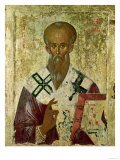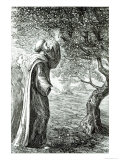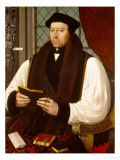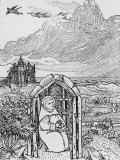|
|
|
John Calvin
b. 7-10-1509; Noyon, Picardy, France
d. 5-27-1564; Geneva, Switzerland
John Calvin, born a Catholic, was Protestant theologian and reformer whose ministry in Geneva, Switzerland attracted Protestant refugees from across Europe.
John Calvin quotes ~
• “God preordained, for his own glory and the display of His attributes of mercy and justice, a part of the human race, without any merit of their own, to eternal salvation, and another part, in just punishment of their sin, to eternal damnation.”
• “For there is no one so great or mighty that he can avoid the misery that will rise up against him when he resists and strives against God.”
• “God tolerates even our stammering, and pardons our ignorance whenever something inadvertently escapes us - as, indeed, without this mercy there would be no freedom to pray.”
• “Man's mind is like a store of idolatry and superstition; so much so that if a man believes his own mind it is certain that he will forsake God and forge some idol in his own brain.”
• “Yet consider now, whether women are not quite past sense and reason, when they want to rule over men.”
• “I consider looseness with words no less of a defect than looseness of the bowels.”
• John Calvin at Powell's Books
|
|
|
|
Bartolome de las Casas
b. 8-24-1484; Seville, Spain
d. 7-17-1566; Madrid
Bartolome de las Casas, Dominican missionary priest and the first resident Bishop of Chiapas, came to the defense of the indigenous peoples after witnessing the slavery, torture and genocide of the Native Americans by the Spanish colonists.
Bartolome de las Casas quote ~
• “The reason the Christians have murdered on such a vast scale and killed anyone and everyone in their way is purely and simply greed. . . . Their insatiable greed and overweening ambition know no bounds; the land is fertile and rich, the inhabitants simple, forbearing and submissive. The Spaniards have shown not the slightest consideration for these people, treating them (and I speak from first-hand experience, having been there from the outset) not as brute animals - indeed, I would to God they had done and had shown them the consideration they afford their animals - so much as piles of dung in the middle of the road. They have had as little concern for their souls as for their bodies, all the millions that perished having gone to their deaths with no knowledge of God and without the benefit of the Sacraments. One fact in all this is widely known and beyond dispute, for even the tyrannical murderers themselves acknowledge the truth of it: the indigenous peoples never did the Europeans any harm whatever; on the contrary, they believed them to have descended from the heavens, at least until they or their fellow citizens had tasted, at the hands of these oppressors, a diet of robbery, murder, violence, and all other manner of trials and tribulations.”
• Bartolome de las Casas at Powell's Books
|
|
|
|
Saint Catherine of Siena
b. 3-25-1347; Siena, Italy
d. 4-29-1380; Rome
Saint Catherine of Siena was a lay member of the Dominican Order, a scholastic philosopher, and theologian.
She dedicated to her life at age four to ‘praying, meditating and living in total solitude’ into her late teens when she experienced a ‘Mystical Marriage’ with Jesus and began to help the sick and poor.
In 1370 Catherine received visions that commanded her to leave her solitary life and go into public works. She began pleading for peace among the Italian factions and to end the Western Schism on the Church.
Catherine of Siena, with Teresa of Avila and Thérèse de Lisieux, are the only three women who are Doctors of the Church.
Saint Catherine of Siena quotes ~
• “Nothing great is ever achieved without much enduring.”
• “To a brave man, good and bad luck are like his right and left hand. He uses both.”
• St. Catherine of Siena at Powells Books
|
|
|
|
Saint Clement, Pope Clement I
fl. 96 AD; Rome
St. Clement was the first Apostolic Father of the Church and according to Tertullian, consecrated by Saint Peter.
|
|
|
|
Saint Columba
b. 12-7-521; County Donegal, Ireland
d. 6-9-597; Iona, Scotland
Saint Columba, one of the Twelve Apostles of Ireland, was a missionary monk who introduced Christianity to the Kingdom of the Picts (Scotland) during the Early Medieval Period.
He is also known as Colmcille and sometimes referred to as Columba of Iona, or, in Old Irish, as Colum Cille (meaning “Dove of the Church”).
Saint Columba quote ~
• “Let me bless almighty God,
whose power extends over sea and land,
whose angels watch over all.
Let me study sacred books to calm my soul:
I pray for peace,
kneeling at heaven's gates.
Let me do my daily work,
gathering seaweed, catching fish,
giving food to the poor.
Let me say my daily prayers,
sometimes chanting, sometimes quiet,
always thanking God.
Delightful it is to live
on a peaceful isle, in a quiet cell,
serving the King of kings.”
|
|
|
|
Thomas Cranmer
b. 7-2-1489; Aslacton, England
d. 3-21-1556; Oxford (burned at the stake & ashes scattered)
Thomas Cranmer was the Archbishop of Canterbury during the reigns of Henry VIII and Edward VI. He helped Henry VIII divorce Catherine of Aragon and publishing the first authorized service in the language of the people, thus separating the Church in England from the Church in Rome. He also wrote the Book of Common Prayer. Thomas Cranmer was burnt at the stake by Mary I (daughter of Catherine & Henry) for heresy.
Thomas Cranmer quotes ~
• “This was the hand that wrote it (his recantation), therefore it shall suffer first punishment.”
• “Man's folly hath enhanced the value of gold and silver because of their scarcity; whereas nature, like a kind parent, hath freely given us the best things, such as air, earth, and water, but hath hidden from us those which are vain and useless.” Utopia, Bk 2
• “I do not care very much what men say of me, provided that God approves of me.” — A Letter to Erasmus, 1532. Utopia, Bk 2
• Thomas Cranmer at Powell's Books
|
|
|
|
Saint Cuthbert of Lindisfarne
b. c. 634; Northunbria (Scotland)
d. 3-20-687
Between 676 and 684 the monk Cuthbert became a hermit on one of the Farne Islands where he instituted what may have been the first bird protection laws anywhere in the world. Today eider ducks are often called cuddy ducks (Cuthbert's ducks) in modern Northumbrian dialects.
|
|
|
previous page | top | next
theology | theologians list > a | b | C | d-e-f-g | h-i-j-k | l | m-n-o | p-q-r | s | t-u-v | w-x-y-z
|
|
I have searched the web for visual, text, and manipulative curriculum support materials - teaching posters, art prints, maps, charts, calendars, books and educational toys featuring famous people, places and events - to help teachers optimize their valuable time and budget.
Browsing the subject areas at NetPosterWorks.com is a learning experience where educators can plan context rich environments while comparing prices, special discounts, framing options and shipping from educational resources.
Thank you for starting your search for inspirational, motivational, and educational posters and learning materials at NetPosterWorks.com. If you need help please contact us.
|
|
|









